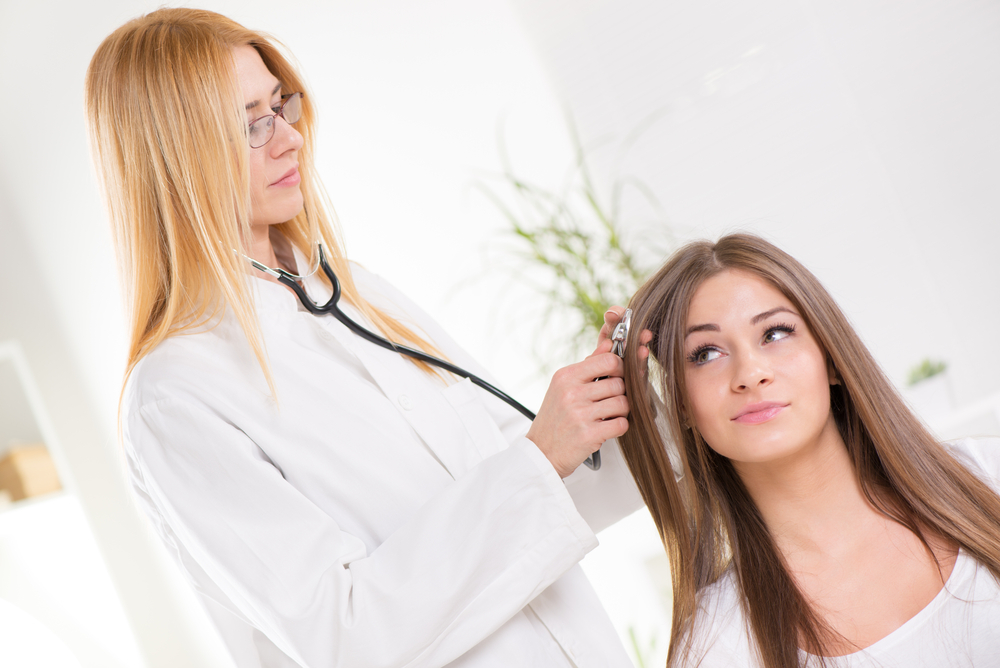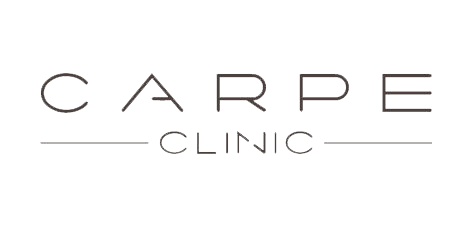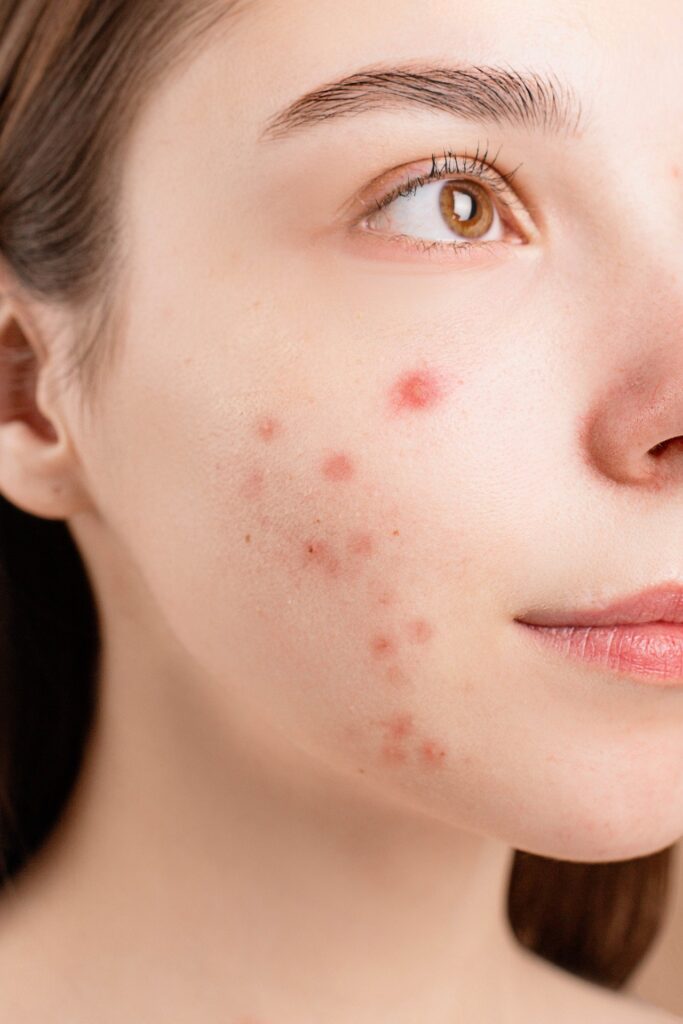What is alopecia?
Have you ever thought “My hair isn’t growing anymore.”? Alopecia areata is a common medical condition that causes hair loss and can affect people of all ages and genders. It can affect both men and women and has forms that vary in severity and extent.
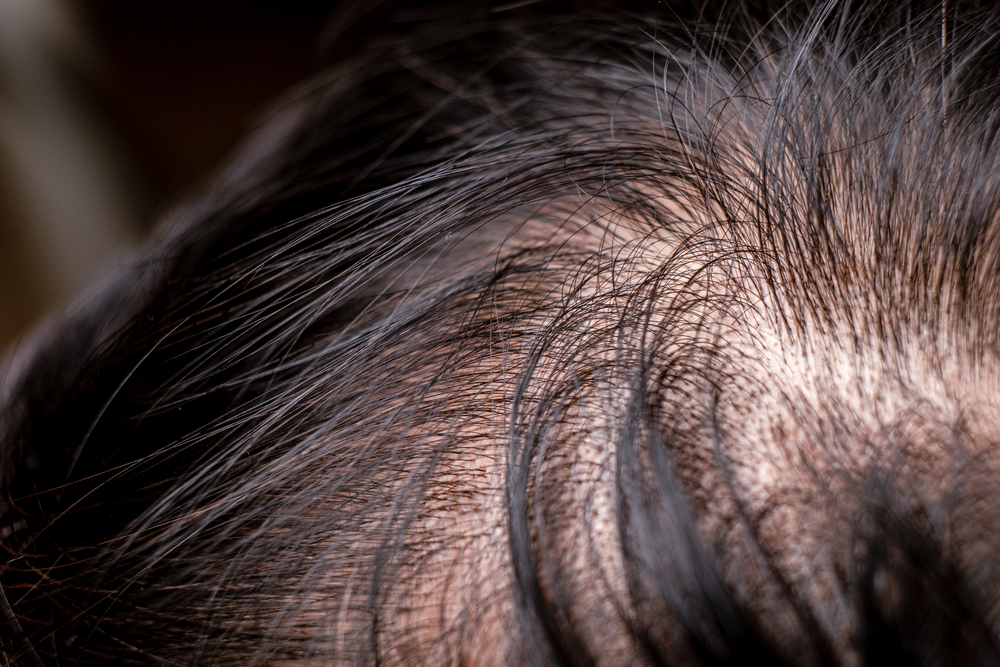
Different forms of alopecia
Alopecia areata comes in multiple forms and can exhibit a variety of patterns and symptoms. It can be challenging to understand and distinguish the many variations of alopecia, especially since each type of hair loss can have unique causes and treatment options. Below, we list the most common forms:
Alopecia areata
Alopecia areata is a form of alopecia in which the immune system suddenly attacks healthy hair follicles. This leads to the formation of round or oval bald patches on the scalp, but it can also occur on other hairy parts of the body. These bald patches can vary in size and number and can sometimes recover on their own, but in some cases hair loss can be progressive and spread to other areas of the scalp.
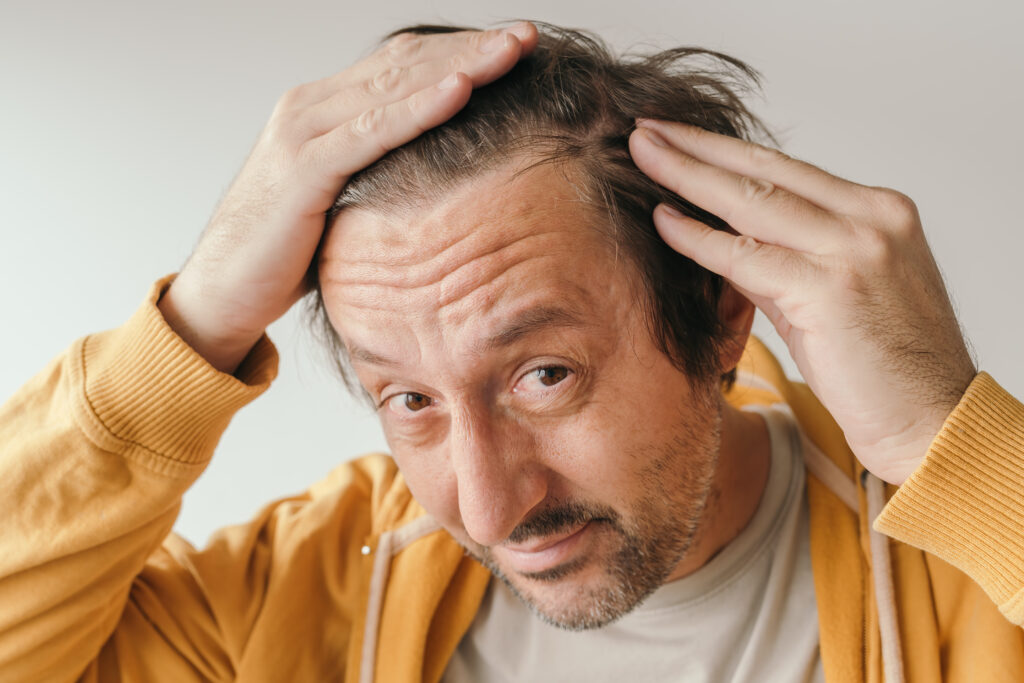
Alopecia diffusa
Alopecia diffusa, also known as diffuse hair loss, is a form of hair loss in which hair thins evenly over the entire scalp. Unlike other forms of alopecia, in which hair loss manifests as individual bald patches or patterns, diffuse hair loss is characterized by an even thinning of hair over the entire head.
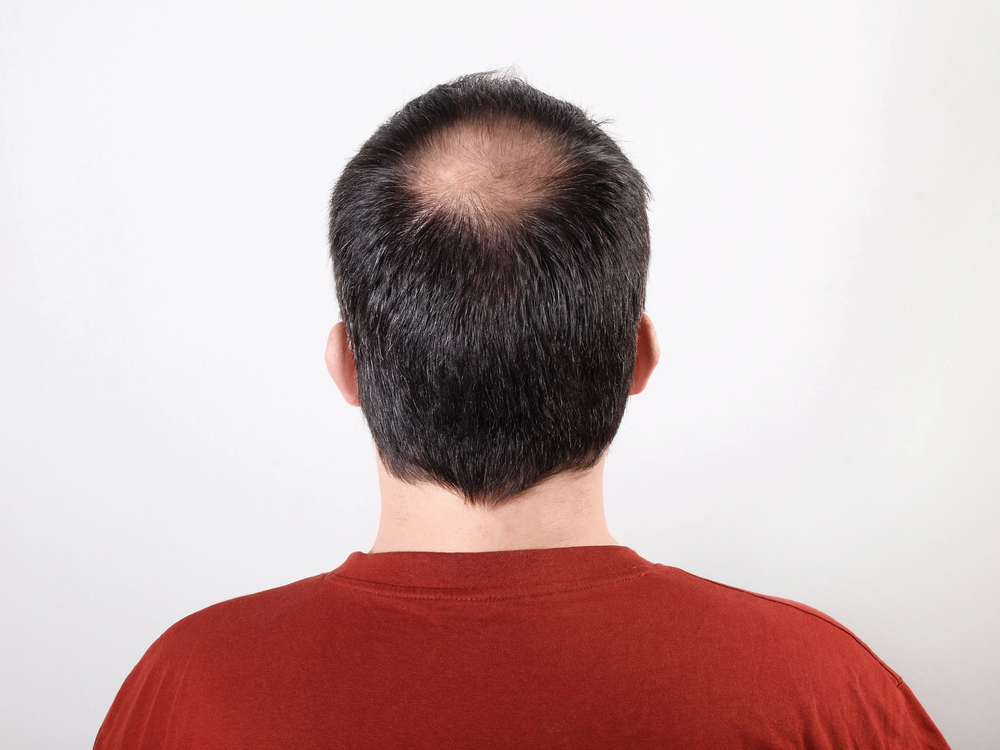
Alopecia totalis
This is a more extensive form of alopecia in which all the hair on the scalp is lost. This means that not a single hair remains on the head. This form of alopecia can have a huge impact on the self-esteem and self-confidence of the affected person because the hair loss is very noticeable and visible.
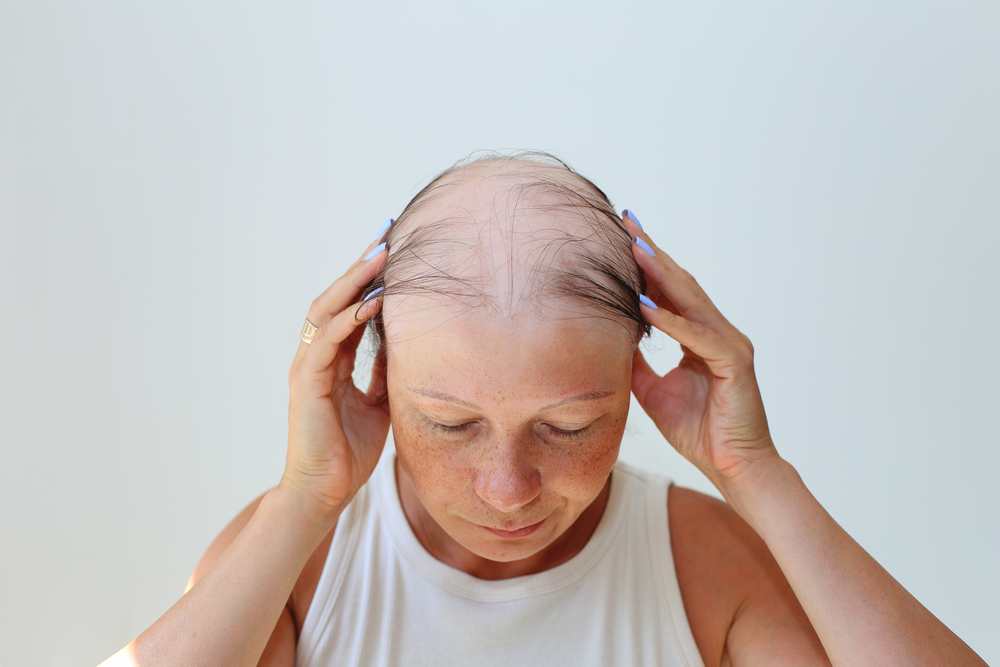
Alopecia universalis
This is the most extreme form of alopecia, where all body hair is lost, including eyelashes, eyebrows and body hair. This can leave you with no hair anywhere on your entire body. This form of alopecia is relatively rare, but can take a very emotional and psychological toll on those who experience it.
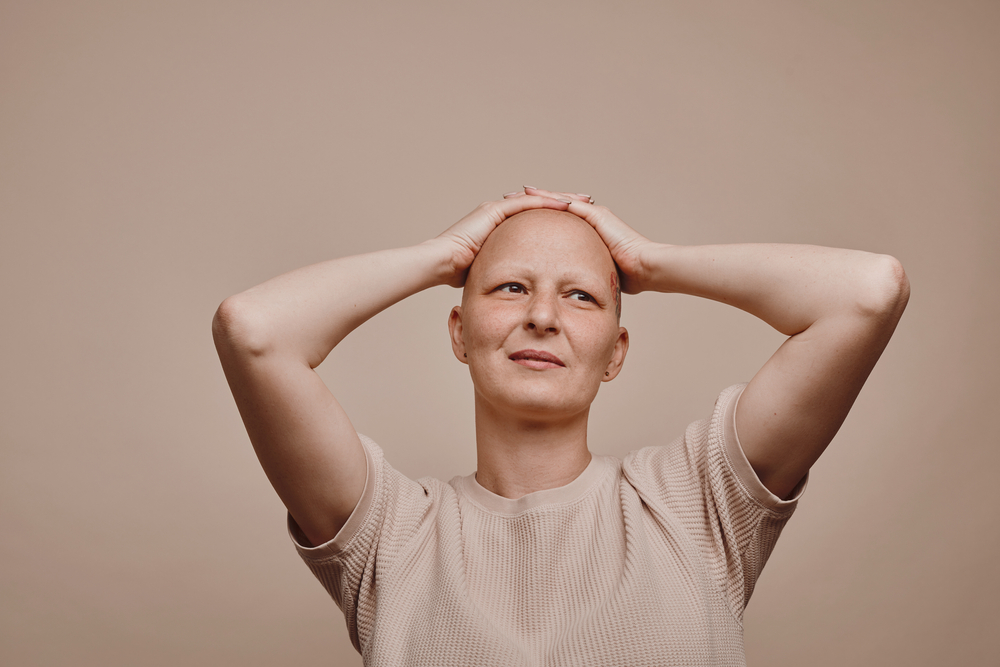
The causes of hair loss
Hair loss can be caused by a variety of factors, ranging from internal biological processes to external environmental influences. Some of the major causes of hair loss are discussed below:
Stress and hair loss
Stress can play a significant role in causing or worsening hair loss. Although stress by itself does not directly cause alopecia areata, it can contribute to hair loss in people who are already predisposed to hair problems.
Prolonged stress can unbalance the body and negatively affect the hair growth cycle. Under stressful conditions, stress hormones are released into the body, such as cortisol, which can disrupt the hair growth process. This can lead to an increased number of hair follicles in the resting phase, also called the telogen phase, resulting in hair loss. Hair loss may not manifest immediately, as hair follicles that enter the resting phase do not fall out for several months.
Stress management techniques such as meditation, exercise and relaxation exercises can help reduce the effects of stress on the body and thus also reduce the risk of hair loss.

The influence of nutrition
A healthy diet plays a crucial role in maintaining healthy hair. Several nutrients are essential for optimal hair growth, including protein, iron, zinc, vitamin D, omega-3 fatty acids and various vitamins and minerals. A deficiency of these nutrients can contribute to hair loss. Therefore, it is important to follow a balanced diet rich in nutrients that are beneficial to hair.
A varied diet consisting of foods such as fish, eggs, nuts, seeds, green leafy vegetables and whole grains can help nourish the hair follicles and support hair growth. In some cases, supplementing nutrition with dietary supplements can also be helpful, especially if there are nutritional deficiencies.

Medication and hair growth
Some medications can cause hair loss as a side effect. Chemotherapy is a well-known treatment that can temporarily cause hair loss, because it attacks the rapidly dividing cells, including the hair follicles. After chemotherapy ends, hair can usually begin to grow back.
Other medications, such as some birth control pills, antidepressants and blood pressure medications, can also cause hair loss. If you find that medications cause hair loss, it is important to discuss this with your doctor to consider possible alternatives that do not adversely affect hair growth.
Symptoms and consequences
Alopecia can manifest itself in different ways, depending on the specific type and severity of the condition. Here are some common symptoms and consequences:
Symptoms of alopecia
Bald spots: One of the most prominent symptoms of Alopecia Areata is the formation of round or oval bald patches on the scalp or other hairy parts of the body. These spots can vary in size and number and may appear suddenly for no apparent reason.
Overall hair loss: In Alopecia Totalis, all the head hair is lost, resulting in complete baldness of the scalp. Sometimes the hair loss goes even further and includes all body hair, including eyelashes and eyebrows.
Diffuse hair loss: Androgenetic alopecia in women is often characterized by diffuse hair loss over the entire scalp, with hair becoming progressively thinner.
Effects of alopecia
Emotional impact: The effects of alopecia go beyond physical symptoms. Hair loss can take a significant emotional toll and negatively impact self-image and self-confidence. The loss of hair, often considered an important part of one’s identity, can cause feelings of insecurity, sadness, shame and depression.
Social and psychological consequences: People suffering from alopecia may withdraw from social activities and avoid social situations because of fear of others’ judgment of their appearance. This can lead to feelings of isolation and reduced quality of life.
Self-awareness and hiding hair loss: Many people with alopecia may be constantly aware of their hair loss and try to hide it by wearing hats, scarves, wigs or other hair replacement techniques. Constantly trying to hide hair loss can be emotionally exhausting and further undermine self-confidence.
Changes in self-image: For some, losing hair can have a profound impact on how they see themselves and how they present themselves to others. This can lead to an altered self-image and a sense of loss of self-worth.
Impact on relationships and career: Alopecia can also affect personal relationships and career opportunities. Some people may feel insecure in social situations or at work because of their appearance, which can affect their relationships and career opportunities.
It is important to recognize that this is not only a physical condition, but also presents emotional and psychological challenges. Seeking professional support, sharing experiences with others in similar situations and talking about feelings and fears with loved ones can all help cope with the effects of alopecia. In addition, various psychological interventions, such as counseling and therapy, are available to help people cope with the emotional impact of hair loss and restore their self-confidence and well-being.
What can you do yourself?
If you are experiencing alopecia, there are some steps you can take yourself to control hair loss and promote your well-being. Here are some things you can do yourself:
Consult a doctor or dermatologist: If you find that you are suffering from unexplained hair loss, it is important to consult a doctor or dermatologist for a thorough evaluation and diagnosis. An accurate diagnosis can help determine the specific cause of the hair loss and establish the appropriate treatment plan.
Stress management: Try to reduce or manage stress as much as possible, as prolonged stress can worsen hair loss. Practicing relaxation techniques such as meditation, yoga or breathing exercises can help reduce stress and balance the body and mind.
Healthy diet: Maintain a balanced diet rich in nutrients beneficial to hair growth, such as protein, iron, zinc, vitamin D, omega-3 fatty acids and various vitamins and minerals. Consider dietary supplements if necessary, but consult a doctor first to determine which supplements are appropriate for your situation.
Avoid tight hairstyles: If you find that tight hairstyles aggravate hair loss, try soft hairstyles as much as possible to avoid putting constant stress on the hair.
Use mild hair products: Choose mild hair products that do not contain harsh chemicals and do not irritate the hair and scalp. Avoid excessive use of styling products and heat styling tools, as they can damage hair.
Hair replacement techniques: If you feel insecure about hair loss, consider wearing wigs, hairpieces or hair extensions to improve the appearance of your hair. Make sure these fit well and are comfortable to avoid discomfort.
Support groups and psychological support: Find local or online support groups for people who are also dealing with alopecia. Sharing experiences and talking with others going through similar challenges can provide comfort and create a sense of belonging. If necessary, consider psychological support or counseling to emotionally cope with hair loss.
Avoid self-medication: Try to avoid using hair products and treatments that are not approved by professionals, as they may not be effective and may even worsen hair loss.
It is essential to remember that alopecia treatment depends on the specific type and cause of hair loss. What works for one person may not work for another. Thus, it is important to seek advice from a medical professional before trying self-treatments. A combination of medical treatments, healthy lifestyle choices and emotional support can help you better manage alopecia and improve your quality of life.
Treatments and solutions
Treatments for alopecia vary depending on the type and severity of hair loss. Here are some common treatment options:
Drug treatments
Corticosteroids: In Alopecia Areata, corticosteroids may be used to reduce inflammation and calm the immune system. These can be applied topically as creams, lotions or foams, or injected directly into the scalp. Corticosteroids help protect hair follicles from immune system attacks and can promote hair growth in affected areas.
Minoxidil: Minoxidil is a medication applied locally to the scalp that helps stimulate hair growth. It can be used for Alopecia Androgenetica, both in men and women. Minoxidil improves blood flow to the hair follicles and can prolong the growth phase of hair, increasing hair density.
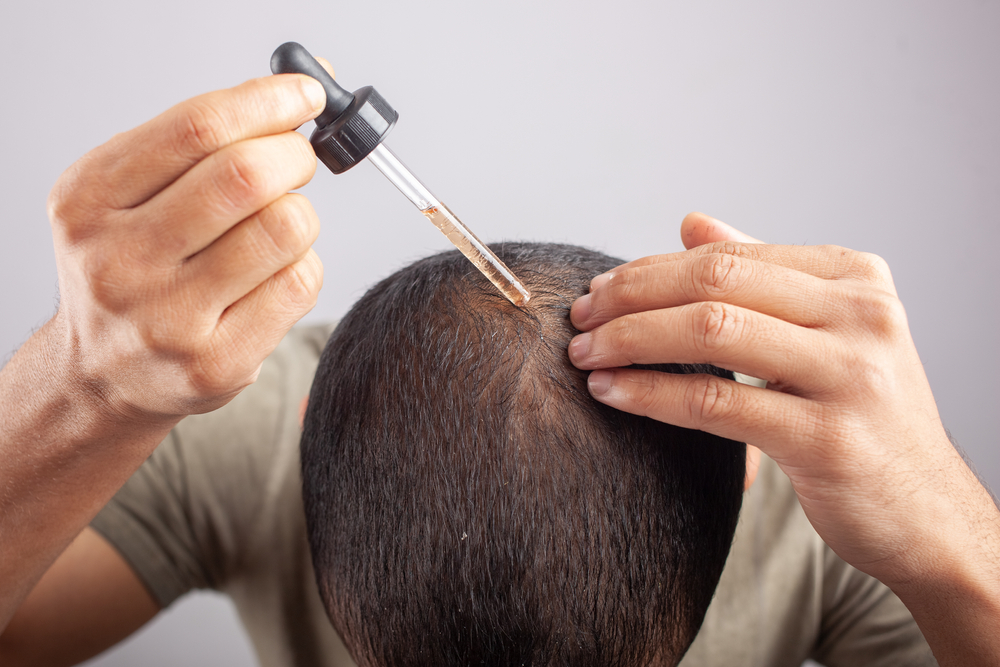
Finasteride: This drug is mainly prescribed to men with Androgenetic Alopecia. It works by inhibiting the conversion of testosterone to dihydrotestosterone (DHT), reducing the sensitivity of hair follicles to DHT and slowing further hair loss.
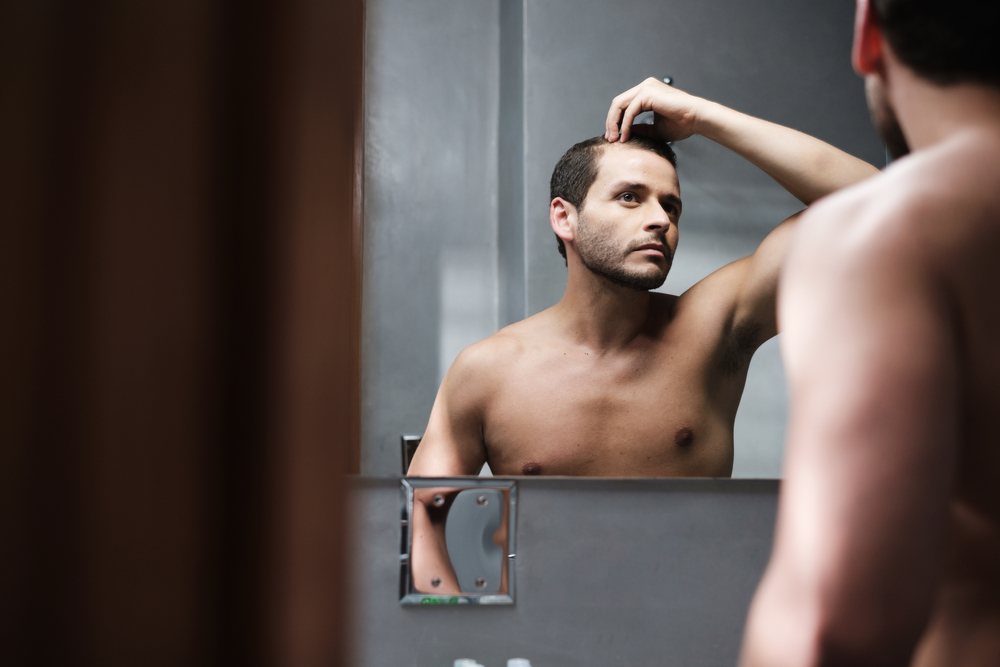
Hair transplantation and hair replacement techniques
Hair Transplantation: For people with advanced hair loss, especially with Androgenetic Alopecia, hair transplantation can be an effective and permanent solution. In this procedure, healthy hair follicles from a donor area, usually the back or sides of the scalp, are transplanted to the bald area. Over time, the transplanted hair grows in the new location, restoring hair loss.
Wigs and hairpieces: For temporary solutions to hide hair loss, wigs or hairpieces can be used. These can give a natural-looking appearance and help boost self-confidence. Several types of wigs are available, made of synthetic fibers or real hair.
Alternative therapies and complementary treatments
Laser therapy: Low-level laser therapy is sometimes used to stimulate hair growth in people with alopecia. The laser beams can improve blood flow to the hair follicles and stimulate metabolism in the cells.
Acupuncture: Some people try acupuncture to promote hair growth and reduce hair loss. Acupuncture can help improve blood circulation and balance energy in the body.
Natural supplements: There are several dietary supplements and herbal preparations that are promoted as means of reducing hair loss. Examples include biotin, zinc, vitamin D, and Saw Palmetto extract. Consult a physician before using such supplements to ensure that they are safe and appropriate for your individual needs.
Tips for dealing with hair loss
Dealing with hair loss can be emotionally and psychologically challenging. It is essential to surround yourself with supportive people, such as family and friends, and seek professional help if needed. You can take other actions in addition to these things:
Seek support from loved ones: Talk openly with family and friends about your hair loss and how it is affecting you emotionally. Sharing your feelings and fears with people you trust can be a great relief and they can support you during this challenging period.
Seek professional help if needed: If you are struggling to cope emotionally with hair loss, don’t hesitate to seek professional help from a counselor, therapist or psychologist. These professionals can help you cope with the emotional impact of hair loss and give you the tools to promote your well-being.
Join support groups: Consider joining local or online support groups for people with alopecia or hair loss. Sharing experiences and stories with others in the same situation can create a sense of community and understanding.
Stay positive: Try to keep a positive mindset and focus on other aspects of your life that make you happy. While it is normal to be sad or worried about your hair loss, it is important not to allow it to dominate your entire life.
Self-care: Take time for self-care and do activities you enjoy. Whether it is exercising, walking in nature, reading a book or practicing relaxation techniques, this can help reduce stress and calm your mind.
Experiment with new looks: Try to see the loss of your natural hair as an opportunity to try out new looks. Perhaps you can wear different wigs, scarves or other accessories to change your look and boost your confidence.
Stay socially active: It is understandable that you sometimes feel withdrawn because of your hair loss, but try to stay socially active. Being with friends and family can distract you and give you a sense of belonging.
Focus on inner beauty: Realize that beauty goes beyond appearance. Try to focus on your inner beauty, your qualities and accomplishments, and remind yourself that your hair loss does not define you as a person.
Keep perspective: Hair loss can be challenging, but it is important to remember that it is not life-threatening and that there are options for dealing with alopecia areata. It may take time, but with the right support and treatment, you can restore your well-being.
Seek professional help with hair replacement: If you are in need of hair replacement techniques, such as wigs or hairpieces, look for a reliable specialist who can help you find a solution that suits you.
Remember, it is normal to feel overwhelmed by hair loss, but with the right approach and support, you can help yourself overcome this challenge and maintain a positive outlook on yourself and your appearance.
Table of Contents
Make an appointment
Do you have questions?
Make an appointment at our clinic.
See also
- Hyperpigmancy
- Hypopigmentation
Contact Carpe Clinic!
Are you looking for professional help for alopecia? Carpe Clinic specializes in treatments to stimulate hair growth. We can provide you with expert advice and a customized treatment plan to restore your hair growth and improve your self-confidence. Contactus soon for more information!
